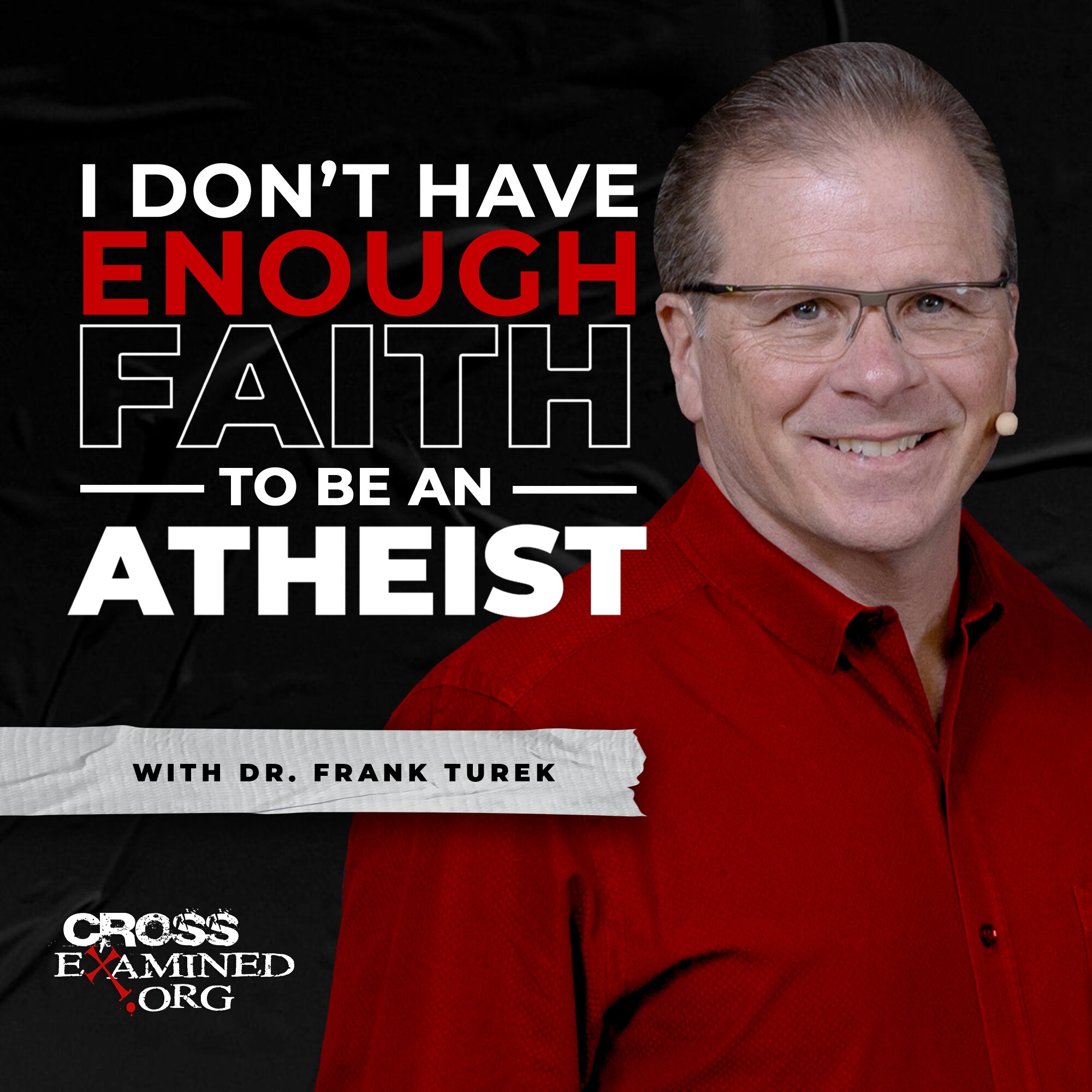
Carry Your Cross
Carry Your Cross is more than a podcast—it’s a call to bold, Kingdom-centered living in a culture that’s constantly shifting. Rooted in scripture, we tackle real issues at the intersection of Christianity, culture, and modern life. From pressing topics to raw testimony, each episode delivers truth, perspective, and practical wisdom to strengthen your walk and empower you to carry your cross with purpose and conviction.
Carry Your Cross
#17 The Clash of Miracles: Science vs. Faith
In this episode, I explore the relationship between science and faith, particularly focusing on the Big Bang theory and the resurrection of Jesus Christ. I argue that both science and religion ask for belief in miracles, and I challenge listeners to consider the implications of fine-tuning in the universe as evidence of a creator. The discussion emphasizes the historical claims of the resurrection and the rationality of believing in a personal God who intervenes in history.
Takeaways
- Joe Rogan's journey from atheism to belief in Jesus.
- Science asks for one miracle: the Big Bang.
- The resurrection of Jesus is a historical event.
- Fine-tuning of the universe suggests intentional design.
- The universe's constants are precisely balanced for life.
- No one dies for a lie; the resurrection is credible.
- Belief in one miracle makes belief in another plausible.
- Science and faith may not be enemies after all.
- Creation points to the existence of a Creator.
- Truth should guide our beliefs and actions.
Joe Rogan clip from episode #2317 of, 'The Joe Rogan Experience': https://youtu.be/3oZSxMidp7E?si=JnjB9EgIKDez26rC
Podcast YouTube: www.youtube.com/@CarryYourCrossStudios
Podcast Instagram: https://www.instagram.com/pespinoza.cyc?igsh=NTc4MTIwNjQ2YQ%3D%3D&utm_source=qr
Podcast Tik Tok: https://www.tiktok.com/@pespinoza.cyc?_t=ZT-90h92JzOlS3&_r=1
Podcast X: https://x.com/pespinoza_cyc?s=21&t=vzzEhA-487cZL4Idn_YHAQ
Hey everyone, how's it going? I wanted to share a clip with you real quick and this is the clip that I'm going to base this episode on. But it's a clip of Joe Rogan explaining his view on the Big Bang and his view on the resurrection of Jesus Christ. For those of you who have been following Joe Rogan for a while, especially if you're a Christian, you would have realized by now that he has made leaps and bounds
with his faith. ⁓ He started off as just complete atheist turned into agnostic. And now I really believe that he's a true believer of Jesus Christ. Just in the way he speaks, the types of guests he's been having on lately and the claims that he's making as of late. So let me play this clip for you real quick and then we'll get into the episode.
I'm sticking with Jesus on that one. Jesus makes more sense. The difference between science and religion is that science only asks you for one miracle. I you to believe in one miracle, the Big Bang. It's funny because people would be incredulous about the resurrection of Jesus Christ, but yet they're convinced.
that the entire universe was smaller than the head of a pen and for no reason then anybody's adequately explained to me. Makes sense. no, I'm instantaneously became everything. Yeah. OK. ⁓ I can't buy that. I'm sticking with Jesus. Jesus makes more sense. makes a great point if you really think about it. So science is known for making all these extraordinary claims for having these
these stances where they're not willing to budge. they will then turn around and ask for one miracle and that's the Big Bang, right? ⁓ That is their belief. That's their origin belief. That's where they believe this all came from. And if you speak to atheist, they believe that
You know, we are just cosmic accidents. We are stardust bumping into stardust with purpose in life. And obviously that's just wrong. now with overwhelming evidence a creator and creation can be accredited to a creator.
Right, and so actually we're gonna get into the fine tuning argument. But first, wanna just start off asking this simple question. Is the resurrection of Jesus Christ more believable the Big Bang?
I know that might sound outrageous to some, but let's slow down, take a breath and really think about it. Let's begin with a quote by the late McKenna, was a mystic. And so Terence McKenna said, modern science is based on the principle.
Give us one free miracle and we'll explain the rest. miracle is the appearance of all the mass and energy in the universe and all the laws that govern it in a single instant from nothing. So let's pause, let that sink in. Science begins with a miracle, the Big Bang, a singularity.
Everything, space, time, matter, energy, even the laws of physics, emerging from absolute nothingness. And somehow we've agreed that this one miracle is acceptable. But when it comes to the resurrection of Jesus Christ, a first century Jewish man who
predicted his own return, we say impossible. We scoff at the idea. Why is this? unpack this idea of a free miracle. In scientific cosmology, the Big Bang is the accepted origin story. the question remains, why did it happen? What caused it?
Science can describe what happened after the Big Bang with astonishing precision, seconds, microseconds, even nanoseconds after it all began. what about before?
nothing. Not empty space, not a vacuum, nothing. And out of that nothing, everything. like Stephen Hawking have tried to explain using quantum mechanics. They say perhaps the laws of quantum physics allow particles to spontaneously appear from nothing. But then we have to ask, where did those laws come from?
Why is there something rather than nothing?
These are metaphysical questions, questions science can't answer. They belong to the realm of philosophy and theology. So in essence, modern science says, give us this one inexplicable moment and we'll take it from there.
Now, let's take this one step further. Let's say we accept that the universe came into existence from nothing. Now, we have to deal with what scientists call fine-tuning. the idea. The universe's physical constants, the gravitational constant, the strength of the electromagnetic force, the mass of the proton,
the rate of cosmic expansion
all set with incredible precision.
If just one of these constants were even slightly off, life as we know it wouldn't exist. Change the strength of gravity by one part 10 to the 60th power and stars wouldn't form. Tweak the strong nuclear force and atoms couldn't hold together.
is not just statistical curiosity. is breathtaking balance, like throwing a dart across the universe and hitting a bullseye one millimeter wide.
Physicist Paul Davies said, the impression of design is overwhelming. So the question becomes, is this the result of chance or choice?
Does it really make sense to believe that such extraordinary precision, so favorable to life just happened?
this the signature of a mind, of a designer, of the God of the Bible who not only creates, but sustains?
The fine tuning of the universe gives us not just a miracle existence, but a miracle of intentionality.
Genesis 1, 1 to 3.
In the beginning, God created the heavens and the earth. Now the earth was formless and empty. over the surface of the deep,
And the Spirit of God was hovering over the waters. God said, let there be light. And there was light.
Now let's look again at the resurrection. Christianity too is based on a singular miraculous event that Jesus Christ after being crucified, dead and buried rose from the dead. here's the difference. The resurrection is not just a myth. It's claimed as a historical event.
It happened in real time, in real places, with real people who said, we saw him, we touched him, we ate with him.
And then they died for that claim. No one dies for a lie or something they didn't think was true.
We have written records, eyewitness testimony, and manuscripts that predate any myth-making window.
This is not an origin story from nowhere. It's a claim embedded in history, subject to scrutiny, archaeology, and textual criticism.
Again, no one dies for an idea they know they made up.
So let's ask again, if you already believe in one miracle, that everything came from nothing, why is the resurrection so much harder to believe? If the universe is not only fine-tuned, but intentionally then belief in a personal God is not just plausible, it's rational.
If God created the universe, why wouldn't he also intervene in history? Why wouldn't he reveal himself? Why wouldn't he conquer death?
The Big Bang gave us a beginning. Fine-tuning suggests purpose. And the resurrection offers personal hope.
So where does that leave us? Science asks for one miracle and gives us galaxies. Faith asks for one miracle and gives us redemption. Perhaps they're not enemies after all. Perhaps both miracles are real.
And perhaps the deeper question isn't which is more believable, but which miracle you're willing to live your life by.
Everyone hold fast to what is true.
Creation itself is screaming at us and telling us that there is a Creator, there is a God.
So allow this episode to sink in and allow yourself to be led by truth. I'm out.
Podcasts we love
Check out these other fine podcasts recommended by us, not an algorithm.

I Don't Have Enough FAITH to Be an ATHEIST
Dr. Frank Turek
Faith and Friction Podcast
Faith and Friction Podcast
TCM Podcast
True Christian Ministry
The Deep End w/Taylor Welch
Taylor A Welch
The George Janko Show
George Janko
